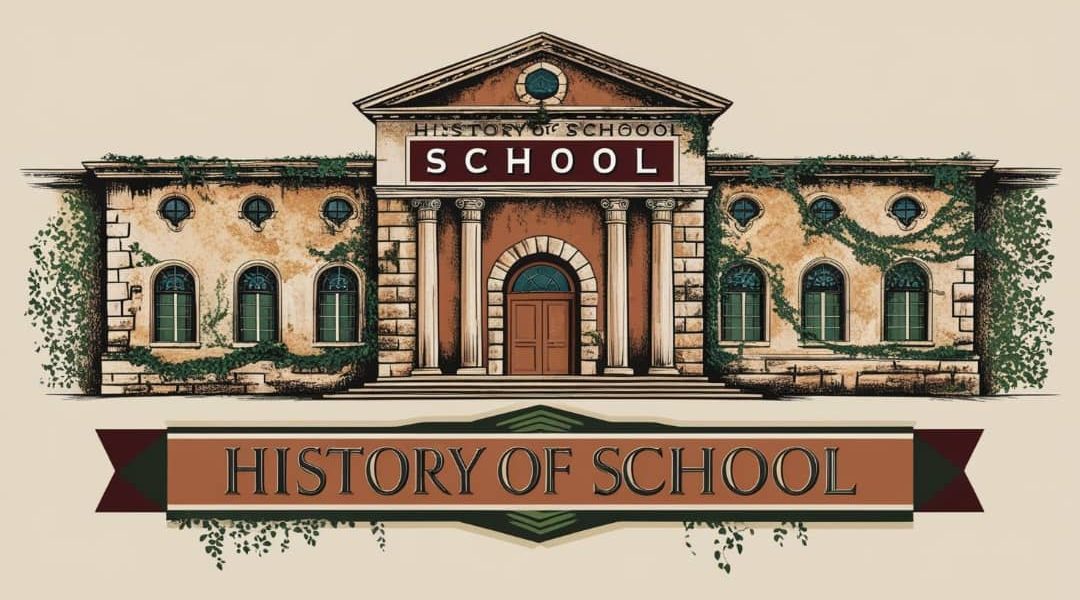History Of School: How School Came To Existence Worldwide And In Nigeria
This Article contains
The Evolution of Schools: A Historical Journey
As humans, we’ve always had an innate desire to learn and pass on knowledge to future generations from time immemorial. From ancient civilizations to modern times, the concept of school has undergone significant transformations, shaping the way we educate ourselves and our children. Education is the backbone of any society, and schools are the foundation upon which this backbone is built. (History Of School) As we explore the history of schools worldwide and in Nigeria, we’ll uncover the fascinating story of how these institutions evolved over time.
The concept of schools dates back to ancient civilizations, where temples and palaces served as centers of learning. In ancient Egypt, Greece, and Rome, education was reserved for the elite, with a focus on philosophy, mathematics, and literature. The ancient Greeks, in particular, valued education, with philosophers like Aristotle and Plato establishing schools that attracted students from across the Mediterranean.
During the Middle Ages, monastic schools emerged in Europe, providing education to monks and clergy. These schools focused on theology, Latin, and classical studies. The University of Bologna, founded in 1088, is considered the oldest continuously operating university in the world. The Renaissance marked a significant turning point in the history of education. Humanism and the revival of classical learning led to the establishment of modern schools. The first public schools were established in Europe during this period, with a focus on providing education to the masses.
In Nigeria, the introduction of Western education was a result of colonialism. The first missionary schools were established in the mid-19th century, with the aim of spreading Christianity and Western values. The British colonial government later established government schools, which provided education to the children of the elite. After Nigeria gained independence in 1960, the government prioritized education, establishing more schools and increasing access to education. The Universal Primary Education (UPE) scheme, introduced in 1976, aimed to provide free primary education to all Nigerian children.
Today, Nigeria’s education system faces numerous challenges, including inadequate funding, poor infrastructure, and a shortage of qualified teachers. Despite these challenges, there are efforts to improve education, including the introduction of technology-enhanced learning and vocational training programs.
Highlights
Ancient Civilizations and the Emergence of Formal Education (3000 BCE – 500 CE)
As we explore the history of schools, it’s essential to acknowledge that the concept of formal education has been around for thousands of years, with ancient civilizations laying the foundation for modern educational systems. Let’s embark on a journey through time and discover how schools evolved worldwide and in Nigeria.
The earliest forms of formal education can be traced back to ancient Mesopotamia, where Edubbas (scribal schools) were established around 3000 BCE. These schools focused on teaching writing, arithmetic, and literature to future scribes and administrators. In ancient Egypt (around 2000 BCE), temple schools were established to educate priests, scribes, and other high-ranking officials. These schools emphasized the study of hieroglyphics, mathematics, and astronomy.
Ancient Greece, known for its rich philosophical heritage, introduced the concept of Paideia (around 500 BCE). Paideia emphasized the development of the whole person, including intellectual, physical, and moral education.
The ancient Romans adopted and adapted Greek educational practices, establishing Ludus litterarius (elementary schools) and Ludus magister (secondary schools). Roman education focused on reading, writing, and rhetoric.
In ancient China, the Taixue (Imperial Academy) was established during the Han Dynasty (206 BCE – 220 CE). The Taixue emphasized the study of Confucian classics, literature, and philosophy.
Ancient India’s Gurukuls (residential schools) date back to the Vedic period (1500 BCE – 500 BCE). Gurukuls provided education in the Vedas, philosophy, and various arts and sciences.
Key figures and philosophers who contributed to the development of education worldwide include:
- Confucius (China): emphasized the importance of education, morality, and personal development
- Socrates (Greece): developed the Socratic method, which encouraged critical thinking and questioning
- Plato (Greece): founded the Academy in Athens, one of the earliest institutions of higher learning
- Aristotle (Greece): tutored Alexander the Great and made significant contributions to philosophy, science, and education
The Middle Ages and the Emergence of Universities (500 CE – 1500 CE)
During the Middle Ages, education in Europe was largely limited to monasteries and convents. The establishment of universities in the 12th century marked a significant turning point in the history of education with The University of Bologna (founded in 1088 CE) and the University of Oxford (founded in the 12th century) serving as the first institutions of higher learning in Europe. These universities focused on the study of theology, law, medicine, and the arts.
The Renaissance and the Emergence of Modern Education (1500 CE – 1800 CE)
The Renaissance marked a significant shift in educational philosophy, with an emphasis on humanism, individualism, and intellectual curiosity. The establishment of schools like the Schola Latina (founded in the 16th century) and the emergence of educators like John Locke and Jean-Jacques Rousseau contributed to the development of modern educational thought.
The Industrial Revolution and the Expansion of Education (1800 CE – 2000 CE)
The Industrial Revolution brought significant changes to education, with an emphasis on vocational training, technical education, and mass education. The establishment of compulsory education laws in many countries, including the United Kingdom (1870 CE) and the United States (1918 CE), marked a significant turning point in the expansion of education.
Education in Nigeria
Education in Nigeria has a rich and complex history, with various influences from traditional, Islamic, and Western educational systems. The earliest forms of education in Nigeria date back to the Hausa city-states (around the 15th century), where Islamic schools (madrassas) were established.
The arrival of European colonizers in the 19th century introduced Western-style education, with the establishment of missionary schools and government-funded schools. Today, Nigeria’s educational system is overseen by the Federal Ministry of Education, with a focus on providing quality education to all citizens.
Traditional Islamic Schools (Madrassas)
Madrassas played a significant role in spreading Islamic knowledge and values throughout Nigeria. These schools focused on teaching Islamic studies, Arabic language, and mathematics.
Christian Missionary Schools
The arrival of Christian missionaries in the 19th century marked a significant turning point in Nigeria’s educational history. Christian missionary schools, such as CMS Grammar School, Lagos (founded in 1859), were established to provide Western-style education to Nigerians.
Government-Funded Schools
The British colonial government established government-funded schools in Nigeria, such as King’s College, Lagos (founded in 1909). These schools provided education to Nigerians, with a focus on preparing them for careers in the colonial administration.
Key Figures and Events
Several key figures and events contributed to the development of education in Nigeria. Some notable examples include:
Thomas Babington Macaulay: A British historian and politician who introduced the concept of Western-style education in India and later influenced the development of education in Nigeria.
Henry Venn: A British Anglican cleric who played a significant role in establishing Christian missionary schools in Nigeria.
Obafemi Awolowo: A Nigerian politician and educator who advocated for free and compulsory education in Nigeria.
The Middle Ages and the Rise of Monastic Schools (500 – 1500 CE)
During the Middle Ages, formal education experienced a significant decline, and the role of schools was greatly diminished. However, this period also saw the rise of monastic schools, which played a crucial role in preserving classical knowledge and promoting education. In fact, monasteries and convents became the primary centers of learning during this period.
The Decline of Formal Education
With the fall of the Roman Empire, the formal education system that had been established by the Romans began to crumble. Many schools were closed, and the study of classical texts and philosophy was largely abandoned. However, the Christian church recognized the importance of education and established monastic schools to preserve classical knowledge and promote education.
The Rise of Monastic Schools
Monastic schools were established within monasteries and convents, and they provided education to monks, nuns, and other members of the clergy. These schools focused on the study of theology, Latin, and classical texts. Monastic schools also played a crucial role in preserving classical knowledge, as monks and nuns copied and translated classical texts, thereby preserving them for future generations.
Key Figures in Education during the Middle Ages
One key figure who promoted education during this period was Charlemagne, King of the Franks. Charlemagne recognized the importance of education and established schools throughout his kingdom. He also promoted the study of classical texts and encouraged the establishment of monastic schools.
The Renaissance and the Emergence of Modern Schools (1500 – 1800 CE)
The Renaissance period marked a significant turning point in the development of modern education. During this time in the History of School, there was a revival of classical learning, which had a profound impact on education.
Revival of Classical Learning
The Renaissance saw a renewed interest in classical texts and learning, which led to a shift away from the narrow, religious-focused education of the Middle Ages. Scholars such as Erasmus and John Locke advocated for a more inclusive and humanist approach to education, emphasizing the importance of classical texts, literature, and philosophy.
Establishment of Modern Schools
This renewed emphasis on classical learning led to the establishment of modern schools, such as grammar schools and academies. These schools provided a more comprehensive education, focusing on subjects like Latin, Greek, mathematics, and literature. In Nigeria, this period saw the establishment of the first Western-style schools by European colonizers.
Key Figures in Educational Reform
Key figures like Erasmus and John Locke played a significant role in shaping educational reform during this period. Erasmus, a Dutch scholar, advocated for a more inclusive approach to education, emphasizing the importance of classical texts and literature. John Locke, an English philosopher, argued that education should focus on developing critical thinking and problem-solving skills.
The Renaissance and the Emergence of Modern Schools In Nigeria
In Nigeria, this period marked the beginning of Western-style education. European colonizers established schools that focus on teaching English, mathematics, and other subjects. This led to a gradual shift away from traditional forms of education and a greater emphasis on Western-style learning


